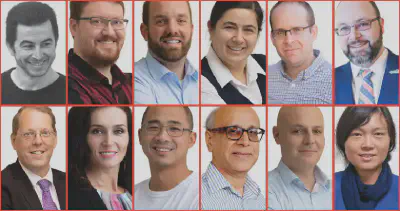Meet the 2019-2020 New Faculty in Ying Wu College of Computing

Written by: Prerna Dar

Whether promising young scholars, researchers with years of experience or seasoned instructors, each year, individuals from around the world join the faculty of Ying Wu College of Computing. In the 2019-2020 academic year, the college welcomed 12 new faculty members, continuing a strategic effort to broaden its impact in research and teaching.
“I am delighted to welcome our newest cohort of faculty members to Ying Wu College of Computing,” Dean Craig Gotsman said.. “At 12 faculty, this is our largest annual cohort to date and demonstrates NJIT’s commitment to expanding the college, which has become a strong engine of growth for the university. I am happy to see such a talented group of faculty coming from close and far, and also from outside the USA. They will undoubtedly take us from strength to strength.”
Department of Computer Science
David Bader, distinguished professor and director, Institute for Data Science
David Bader holds a Ph.D. in electrical engineering from the University of Maryland. His research interests lie at the intersection of data science and high-performance computing, with applications in cybersecurity, massive-scale analytics and computational genomics. Prior to joining YWCC, Bader served as founding professor and chair of the School of Computational Science and Engineering at Georgia Institute of Technology. He served as the lead scientist in DARPA programs such as High Productivity Computing Systems in collaboration with IBM, and is an adviser to the White House on the National Strategic Computing Initiative.
Fun Fact: Bader has a twin sister. He has a strong interest in genomics - the study of genes and their functions.
Przemyslaw Musialski, associate professor
Przemyslaw Musialski holds a Ph.D. in computer science from the Technical University of Vienna (TU Wien) in Austria. His research interests are geometric modeling, geometry processing, computer graphics and digital fabrication. He develops algorithmic solutions which help designers create products directly on computers, avoiding the need to manufacture preliminary prototypes. Prior to joining Ying Wu, Musialski headed the Computational Fabrication group at the Center for Geometry and Computational Design TU Vienna.
Fun Fact: The name Przemyslaw means “Thinker” in ancient Polish. “A name like ‘Adam’ would have made my life easier,” he said.
Pan Xu, assistant professor
Pan Xu holds a Ph.D. in computer science from the University of Maryland, and a Ph.D. in operations research from Iowa State University. His research interests span the intersection of algorithms, operations research and artificial intelligence (AI): stochastic optimization problems arising in e-commerce, internet advertising, crowdsourcing markets, data mining, databases and revenue management.
Fun Fact: The Chinese character of Xu’s first name is highly complicated: it takes 19 strokes to write it.
Ravi Varadarajan, professor of practice
Ravi Varadarajan holds a Ph.D. in computer science from the University of Pennsylvania. His interests include data structures and algorithms, theory of computation, machine learning, parallel processing, and programming in Java and Python. Prior to joining YWCC, Varadarajan taught computer science at the University of Florida. He also worked for companies such as Informix and Lucent) leading and participating in large-scale software projects.
Fun fact: Varadarajan is an avid tennis fan, loves listening to South Indian classical music and watching sci-fi shows like Star-Trek.
Yao Shen, university lecturer
Yao Shen holds a Ph.D. in computational chemistry from the University of Notre Dame. Her research focused on machine learning models to predict patient responses to drug treatment, where she integrated data from next-generation sequencing, chemical structures and patients’ clinical data. Prior to joining YWCC, Shen was a research scientist at Columbia University.
Fun Fact: Shen is an avid badminton player.
Jertishta Qerimaj, university lecturer
Jertishta Qerimaj earned a M.S. in software engineering here at NJIT. Her work focuses on applying artificial intelligence to the financial industry. Qerimaj comes to YWCC with more than 15 years of industry experience as a software developer.
Fun Fact: Qerimaj has never heard of or met anyone with her Albanian name.
Department of Informatics
Jacob Chakareski, associate professor
Jacob Chakareski completed his Ph.D. in electrical and computer engineering at Rice University and Stanford University. His research interests span networked virtual and augmented reality, unmanned aerial vehicles/internet of things (UAV/IOT) sensing and networking, real-time reinforcement learning, 5G wireless edge computing/caching, ubiquitous immersive communication and societal applications. Prior to joining NJIT, Chakareski was an assistant professor of electrical and computer engineering at the University of Alabama.
Fun Fact: Chakareski can speak more than five languages.
Salam Daher, assistant professor
Salam Daher holds a Ph.D. in modeling and simulation from the University of Central Florida (UCF). Her research focuses on using augmented reality (AR) to combine virtual content with the real world, such as 3D modeling of humans in synthetic environments. Prior to joining Ying Wu, Daher was a postdoctoral researcher at the Synthetic Reality Lab at UCF, focusing on the use of AR in healthcare simulation.
Fun Fact: Daher’s artistic side is as strong as her scientific side. She draws, paints, plays music, writes poems, dances and does martial arts.
Cody Buntain, assistant professor
Cody Buntain holds a Ph.D. in computer science from the University of Maryland. His research focuses on social media and how people engage politically online, especially during disasters and times of social unrest. Working with political scientists, he tracks online foreign election interference in U.S. elections, develops techniques to detect this interference across online social platforms and devises information retrieval methods for rapid searches across these platforms. Prior to joining YWCC, Buntain was a postdoctoral research fellow at the Social Media and Political Participation Lab at New York University.
Fun Fact: Buntain has owned two 1970s motorcycles, However, he’s never owned a motorcycle that actually worked.
Tomer Weiss, assistant professor
Tomer Weiss holds a Ph.D. in computer science from the University of California, Los Angeles. His research interests are visual computing, including the virtual simulation of physically embodied AI agents and algorithmic content creation for virtual, augmented and other immersive reality media. Weiss comes to YWCC from the Computer Graphics and Vision Laboratory at UCLA. Before becoming an academic, he held research scientist positions at Amazon, Autodesk Research and Wayfair.
Fun Fact: Weiss did his graduate studies in Los Angeles where it was commonly said that any person you ask on the street either lives next to a celebrity or knows how to surf. Weiss’ Ph.D. advisor won an Oscar, and he live(d) next to Elon Musk and Jennifer Aniston.
Matthew Toegel, university lecturer
Matthew Toegel earned a M.S. in information systems from NJIT. His areas of interest include game development and web development utilizing technologies such as Unity 3D Editor and Google Services. Prior to joining YWCC, Toegel was a lead software engineer at Tata Consultancy Services TCS and a Unity developer at the Gluck Neuroscience Lab at Rutgers.
Fun Fact: Back in college, Toegel launched a startup game studio. “I still continue to work on it. One of these days, I’ll have the bandwidth to help it grow,” he said.
Ryan Tolboom, university lecturer
Ryan Tolboom earned a M.S. in computer science from NJIT. His interests include semiconductor manufacturing, managing IT infrastructure and training teachers on effective use of classroom technology. Before coming to Newark, Tolboom worked as an educator and technology facilitator in the Monroe Township school system in New Jersey.
Fun Fact: Tolboom loves pinball machines and used to own one. “They are always in some state of being broken, which makes each machine unique,” he said.
https://news.njit.edu/introducing-new-faculty-ying-wu-college-computing